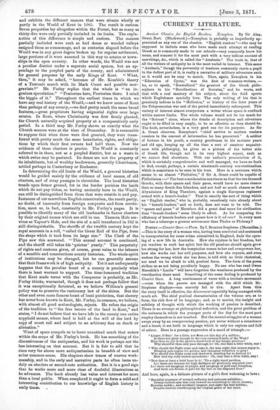CURRENT LITERATURE.
Ancient Classics for English Readers. Xenophon. By Sir Alex.. Grant, Bart. (Blackwood.)—Xenophon is probably as imperfectly ap- preciated as any one of the classics. "English readers "—who may be supposed to include some who have made such attempt at reading Greek as is commonly made in our schools—very commonly know his- name, and connect it for the most part with a very tedious account of marchings, dm., which is called the " Anabasis." The truth is, that of all the writers of antiquity he is the most varied in interest. This IMMO. " Allaba8113," though the perversity of teachers commonly starts a pupil in the dullest part of it, is really a narrative of military adventure such as it would not be easy to match. Then, again, Xenophon in his "Education of Cyrus," was the first of romance-writers, — he, so to speak, "Boswellized" the greatest of the Greek philo- sophers in his "Recollections of Socrates," and he wrote, and that with a real mastery of his subject, about the field sports. which Englishmen specially love. The only writing of his that is genuinely tedious is his " Hellenica," or history of the later years of the Peloponnesian war and of the period immediately subsequent. This. varietyof interest almost overpowers a writer whose space is confined, within narrow limits. The whole volume would not be too mach for the "Retreat" alone, where the details of description and adventure ought to be filled in very amply, to be as effective as they should be. The book, nevertheless, is a very good one for its purpose. As Sir A. Grant observes, Xenophon's "chief service to modern readers- consists in the amount of information he has preserved." A soldier of fortune in his youth, a country gentleman in his matnrer years. and old age, keeping up all the time a sort of amateur acquaint- ance with philosophy, he gives us a picture of the better aide of Greek life, though not in its very highest aspect, such as we cannot find elsewhere. With our author's presentation of it,. which is certainly comprehensive and well managed, we have no fault to find, except, perhaps, a certain nineteenth-century conventionalism which is sometimes to be seen in his tone. Here is a sentence which seems to us almost "Philistine," if Sir A. Grant could be capable of Philistinism :—" The best consideration convinces us that the ten thonand Greeks, with their spears and their ptean, would have no more chance than so many South-Sea Islanders, and not half so much chance as the Abyssinians of King Theodore, against a single European regiment. armed with a breech-loader." That is exactly the sort of thing which an"English reader," who is, probably, senselessly vain already about his "breech-loaders," and so forth, does not want to be told. The "spears and pasan " of Marathon did a great deal more for civilization than " breeeh-loaders " seem likely to effect. As for comparing the efficiency of breech-loaders and spears how is it ad rem? Is every man who has a telescope a greater astronomer than Tholes or Ptolemy ?


































 Previous page
Previous page